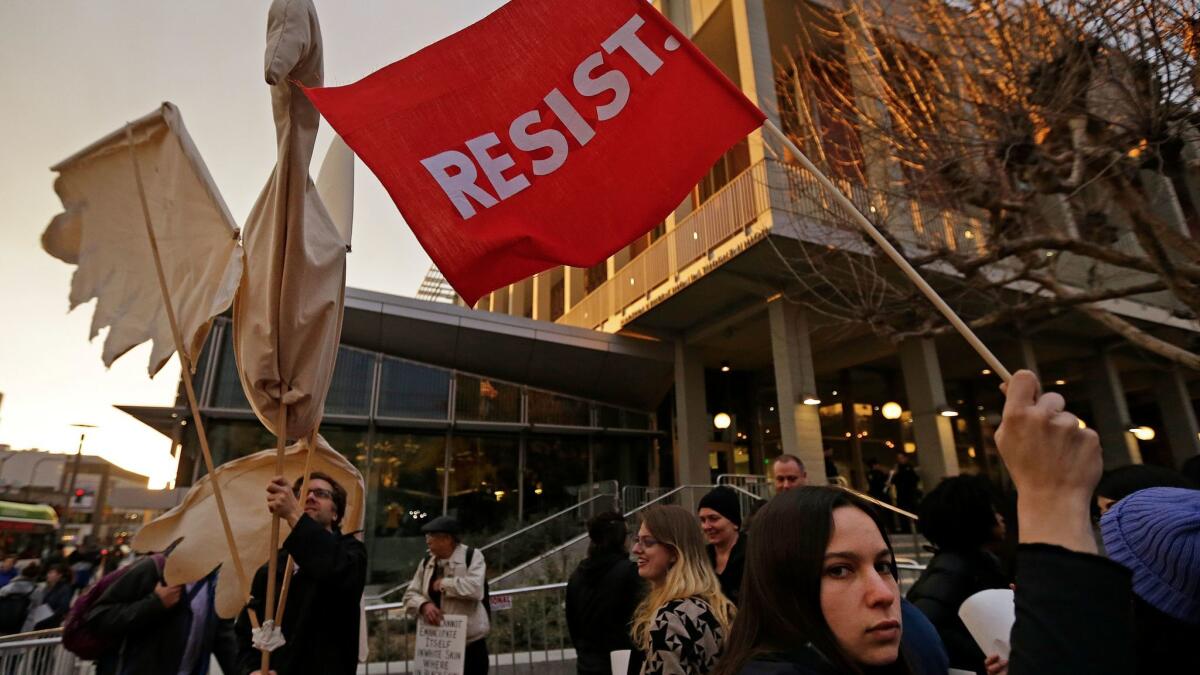Op-Ed: Why are leftists targeting troll columnists like Ann Coulter instead of institutions?

- Share via
California is at the center of the ongoing, nationwide conflict over free speech on college campuses. The latest installment: After Ann Coulter was invited, and then disinvited, to speak at UC Berkeley, university administrators tried to placate the conservative polemicist by rescheduling the event. But they made clear that they couldn’t guarantee her safety, and it looks as though Coulter might not show up after all.
Administrators are worried that the black-clad radicals who protested against alt-right provocateur Milo Yiannopoulos in February will disrupt the streets of Berkeley again — a sad indication that the flagship public university of America’s most populist state is unable to protect the constitutional rights of invited speakers.
However the Coulter affair comes to a close, though, a larger question will remain unanswered: Why do leftists care about an Ann Coulter speech, of all things? Why a Milo speech before that? Since when have protesters focused on preemptively silencing troll columnists? Since when, more importantly, have radicals taken aim at individuals rather than institutions?
Leftist activists so radical that they’ll use force to advance their ends want to ... stop hack pundits from entertaining fratty undergrads.
I’m hardly the first to note that Berkeley, birthplace of the free speech movement, seems to have lost sight of first principles. When Mario Savio stood in front of Sproul Hall in 1964 to denounce a ban on campus political activity, he declared, “There’s a time when the operation of the machine becomes so odious, makes you so sick at heart, that you can’t take part! And you’ve got to put your bodies upon the gears and upon the wheels … upon the levers, upon all the apparatus, and you’ve got to make it stop!”
He cared about the machine — the system — not its loudmouthed byproducts.
Prior to that speech, he railed against the San Francisco Hotel Assn. for denying equal employment opportunities to blacks, and traveled to Mississippi for the Freedom Summer protests against Jim Crow. Soon afterward, Berkeley’s radical left would organize one of the earliest mass protests against the Vietnam War.
Back then, conservatives were the ones who worried that words would hurt us, even when they weren’t aimed at authority figures. Richard Nixon and Ronald Reagan supporters didn’t want George Carlin saying those seven dirty words on television. More recently, Bill O’Reilly fretted that gangsta rap lyrics would corrupt my generation.
Today, many on the right seem to think that words don’t matter at all. President Trump was caught bragging that he grabs and kisses women without their permission. His supporters didn’t care.
Meanwhile, leftist activists so radical that they’ll use force to advance their ends want to ... stop hack pundits from entertaining fratty undergrads.
Are Coulter and Milo offensive? Sure. Are they reactionaries? Sure. But if the masked “anti-fa” protesters want to change the world — which I suppose they do — they would do well to imitate the successful leftism of the old civil rights, anti-war or union movements, with their focus on concrete gains against power, and to forget the critical race theorists, whose Ivory Tower obsession with speech in the 1980s and 1990s yielded nothing for marginalized groups.
Left-wing students are embracing the notion that words do as much harm as the sticks, stones, and laws and institutions that oppress minority groups — but enforcing silence won’t get them anywhere.
Fifteen years ago, when I was a student at Claremont, undergrads were upset about abusive policing. In the spring of 1999, Irvin Landrum Jr., an 18-year-old black man, was shot and killed during a traffic stop. The officers who shot him said they recovered a gun, but it was last registered to the police chief in a neighboring municipality. Calls for an independent investigation into the shooting, and for reforms to policing in Claremont and beyond, were the biggest activist causes during my years on campus.
Today, Claremont students still care about abusive policing. But there is no major movement to transform the Claremont City Council or police department. Students most recently attracted media attention for mobilizing against an individual whose politics they dislike: They shut down a speech by Heather Mac Donald, a Manhattan Institute scholar who studies policing and has criticized Black Lives Matter.
But even if Mac Donald never speaks in public again, police departments will continue to use excessive force. There’s no plausible cause and effect that I can discern.
When radicals disrupt speaking events, they damage 1st Amendment rights, fuel polarization and raise the profile of right-wing provocateurs, all without doing anything to stop “the operation of the machines.”
Conor Friedersdorf is a contributing writer to Opinion, a staff writer at the Atlantic and founding editor of the Best of Journalism, a newsletter that curates exceptional nonfiction.
Follow the Opinion section on Twitter @latimesopinion or Facebook
More to Read
A cure for the common opinion
Get thought-provoking perspectives with our weekly newsletter.
You may occasionally receive promotional content from the Los Angeles Times.










